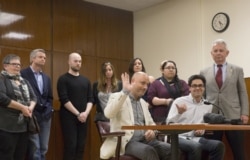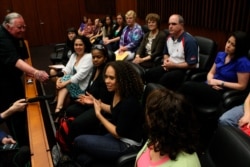The jury that convicted white former Minneapolis Police Officer Derek Chauvin of murder in the death of African American George Floyd consisted of five men and seven women, six of whom were white, four were Black and two were multiracial, according to court information.
The diversity of the jury may have contributed to a more just trial outcome.
“A jury’s racial composition does matter,” says Sam Sommers, a professor of psychology at Tufts University, who studies stereotyping, prejudice and group diversity. “Bias seems more likely when we have homogeneous, or nondiverse, juries. With diverse juries seems to come more wide-ranging and representative discussion of facts in the case.”
Sommers conducted research with mock juries composed of six people — some with an all-white panel, and others with two Black and four white jurors. He found that diverse juries were less likely to presume the defendant’s guilt, more thorough in examining the evidence, clearer on the facts in the case and tended to deliberate an average of 11 minutes longer than all-white juries.
Moreover, Sommers says other studies have shown that all-white juries are more punitive toward Black defendants than diverse juries.
His research shows that white jurors tend to be more careful when evaluating the evidence if there are diverse jurors on the panel.
“There's something about knowing or expecting to have conversations with people from different backgrounds, or different perspectives, that forces us to kick up our cognitive game and process information more carefully,” Sommers says.
Overall, however, diverse juries are the exception, rather than the rule.
“I was surprised to learn that this [Chauvin] jury was diverse, because usually that's not the case in any state in this country. No state has really gotten it right,” says Lila Silverstein, an attorney with the Washington Appellate Project. “Juries are supposed to reflect their communities, and our founders thought this was a critical element of democracy, because the government should not get to decide who should be locked up in prison, or even who should prevail in a civil dispute. Ordinary citizens exercise that right.”
Silverstein says there are major obstacles that keep minorities from serving on juries.
“Some people don't come in because they can't afford it. Some people don't come in because they have to stay home and take care of their children. Some people don't come in because they have a prior criminal conviction and they think that disqualifies them,” she says. “Some people don't come in because they've had negative experiences with the legal system, like being stopped for driving while Black, and they don't want any part of such a system.”
Other practices that Silverstein says need to be changed include sending a jury duty summons by mail only, rather than also sending it electronically, thereby improving the chances that the summons will be received. And the lists of potential jurors need to be drawn from multiple sources and not limited to people with driver's licenses, she adds.
Even if they do make it to the courthouse, potential jurors from minority groups can be among the first to be dismissed.
“It's pretty apparent that prosecutors all across the country — and maybe there's less of it now — but they've systemically tried to exclude Blacks from juries,” says Alan Tuerkheimer, a Chicago jury consultant. “I think traditionally the problem stems from prosecutors, where there's a Black defendant, trying to exclude Black jurors … and that's something that the justice system has had to struggle with over the years.”
As an expert who has worked with both prosecutors and defense teams, Tuerkheimer’s goal is to find a favorable jury for his client, which includes eliminating jurors who might be biased. Prosecutors, he says, have historically assumed a Black juror would be more sympathetic to a Black defendant.
“It's not even an effective strategy just to exclude Black jurors, or jurors of any ethnic group,” he says. “I don't know of any jury consultant that has tried to formulate a jury selection strategy that revolves solely around striking African American jurors or other minorities.”
Silverstein has worked to end practices that effectively exclude minorities from juries. The bright side, as Silverstein sees it, is that criminal justice reform has emerged as a bipartisan issue. She hopes to see blue and red states work to make juries more diverse.
“The Equal Justice Initiative concluded that there is perhaps no arena of public life in which racial discrimination is more widespread and seemingly tolerated than in the selection of juries,” she says.
Sommers says people view the system as fairer and more legitimate when juries are representative.
“Certainly, we want our juries to consider a wide range of information and a broad range of perspectives. The research that I've done, that's what we find, that diverse juries are more likely to do,” he says.







